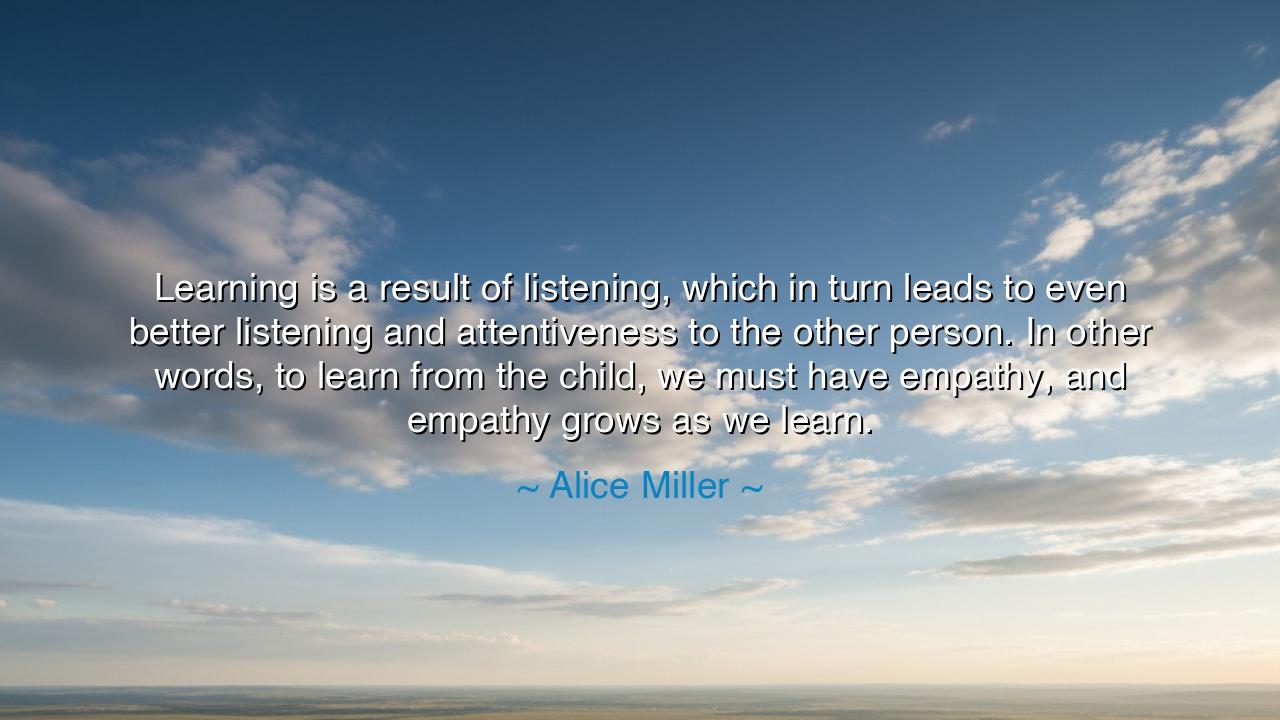
Learning is a result of listening, which in turn leads to even
Learning is a result of listening, which in turn leads to even better listening and attentiveness to the other person. In other words, to learn from the child, we must have empathy, and empathy grows as we learn.






In the tender and illuminating words of Alice Miller, the renowned psychologist and healer of wounded souls, there dwells a truth as ancient as compassion itself: “Learning is a result of listening, which in turn leads to even better listening and attentiveness to the other person. In other words, to learn from the child, we must have empathy, and empathy grows as we learn.” This statement is not merely about education or psychology; it is about the very essence of human connection. In it, Miller unveils a sacred cycle — that learning begins not in speaking, but in listening, and that the heart which truly listens opens itself to empathy, the divine bridge that joins one soul to another.
The origin of this insight lies in Miller’s lifelong work exploring the wounds of childhood and the hidden pain carried within adults. She understood that many of the world’s sorrows — cruelty, pride, indifference — are born from the silence imposed upon children, from voices that were never heard, from emotions dismissed or shamed. In her writings, she sought to break this silence. She taught that to raise a child, or indeed to understand any human being, one must first listen — not with the ears alone, but with the heart. For when one truly listens, without judgment or impatience, one enters the inner world of the other, and there, empathy begins to grow like a seed watered by attention.
To listen, as Miller describes, is an act of humility. It requires us to silence the noise of our own thoughts, to still the restless desire to teach, to fix, to dominate. It is to stand before another being and say, “I see you. I am here.” This kind of listening is rare, for most people do not hear — they wait merely for their turn to speak. But true listening transforms both the speaker and the listener. In listening, we do not lose power; we gain understanding. And from understanding flows compassion, and from compassion flows wisdom. Thus, learning, in its highest form, is not the collection of facts, but the deepening of love.
There is a story told of the great Socrates, who, though famed as the wisest of men, claimed to know nothing. When he spoke with others, he did not instruct them with proclamations but questioned them with patience, drawing truth from their own hearts. His wisdom lay not in what he said, but in how he listened — attentively, with curiosity, with reverence for the truth within others. In this way, he exemplified the very principle that Alice Miller teaches: that knowledge is born of humility, and that to understand another, we must first make space for their voice to be heard.
In the realm of the child, this truth is most vital. A child, fragile yet full of wonder, learns not from commands but from connection. When an adult listens with genuine empathy, the child feels seen, safe, and valued. Their spirit unfolds naturally, like a flower warmed by sunlight. But when a child’s voice is ignored or silenced, their heart retreats into shadows. They learn fear instead of trust, obedience instead of curiosity. Miller’s wisdom calls upon us to reverse this ancient wrong — to become, as she says, learners of the child, not masters over them. For the child carries in their simplicity a wisdom older than our intellect: the purity of feeling, the honesty of being.
And so, empathy and learning are not two separate paths, but one circle of growth. As we listen, we learn; as we learn, our empathy deepens; as empathy deepens, our listening becomes even truer. It is a divine rhythm, a living dialogue between souls. The wise understand that every person we meet — whether child or elder, stranger or friend — has something to teach us, if only we would listen. Thus, to be a great teacher, one must first be a great listener; to be a great parent, one must first become a student of the child’s heart.
The lesson, then, is clear: cultivate the art of listening. Listen not to reply, but to understand. In conversation, set aside your pride, your impatience, your desire to be right. Let your silence be fertile soil in which truth may take root. When a child speaks, or a friend confides, or even when an enemy rages, listen for the pain, the hope, the longing beneath their words. For it is there that empathy is born — and empathy, as Alice Miller reminds us, is the true beginning of wisdom.
So, my listener, remember this: to listen is to love. It is the quiet heroism of the heart. In a world that speaks too much and hears too little, become one who listens. For in listening, you will learn not only about others, but about yourself. You will find that every act of understanding is a healing, every moment of empathy a step toward peace. And perhaps, as Miller dreamed, if we learn to listen — truly, humbly, and with open hearts — we may yet raise a generation that does not wound, but heals; not by power, but by compassion.






AAdministratorAdministrator
Welcome, honored guests. Please leave a comment, we will respond soon